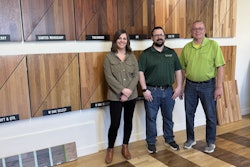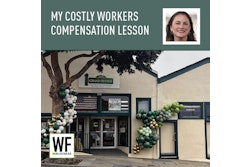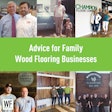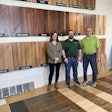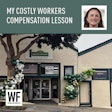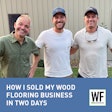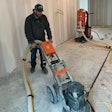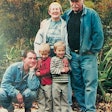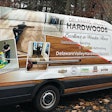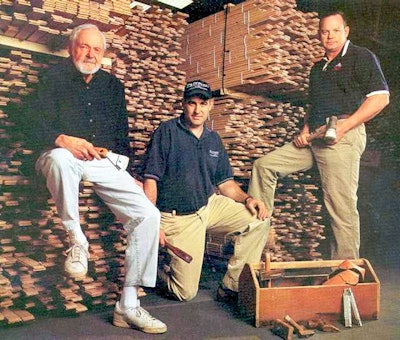
My earliest memory is being 5 years old on a job. It was 1969; we were laying 9-by-9-inch Higgins block and I was getting black tar all over me while my dad was babysitting me. Basically wood flooring is the only thing I’ve ever known. Our entire family was involved in the business, so any time we had a family gathering for Christmas or Thanksgiving, all we ever talked about was wood flooring. My dad was big on education, so all three of us kids went to college, but when I was done and planned to attend law school, times were tough and I was needed in the family business. I don’t have regrets— the floor business has been good to us. On Jan. 8 of this year my father, South Lynn Sr., passed away at 94, and he kept his mind sharp by working in the business until he was 92. Although he’s gone now, he left a legacy at our business, Universal Floors, which he started in 1953. His wisdom and business philosophy still guide us every day; here are some of the key things he taught us through the decades.
He believed that education and elevating people was important
My dad joined the U.S. Navy at the age of 17 during World War II, and after the war he got a business degree at the University of Maryland on the G.I. Bill. When he needed more workers in the early days of the business, he sent school buses down to rural North Carolina to the tobacco fields to recruit workers—he said they had strong work ethic and were willing to work, but they just didn’t know anything except working the crops. He also went into southwest Virginia to pull guys out of the mountains, and he would train them (some of those workers’ children and grandchildren are still here doing the same trade). In a time when D.C. was segregated, he hired Black employees. He had the NOFMA handbook, and it was important to him. One afternoon a week from 4 to 6 he’d have training classes and teach employees to be cross-trained so hardwood guys could learn sanding and the sanding guys could learn hardwood. He liked to elevate the mechanics in the field to sales if they had the ability to do it; that way they had the knowledge of the workings of a job even though they were in sales. He elevated people all the way up the ladder. He’d say, “Money is like manure, it’s no good until you spread it around.”
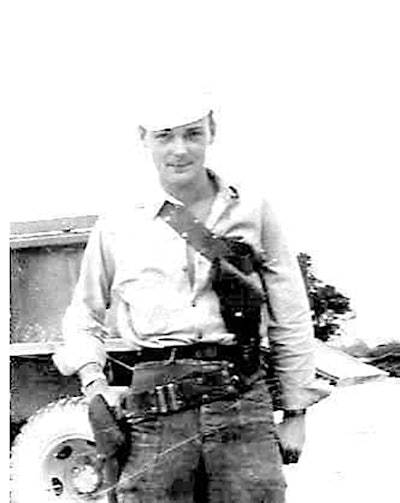 Dad in the Navy in WWII.
Dad in the Navy in WWII.
He focused on collecting money
Something else Dad would always say about money was, “Money is no good in someone else’s bank,” and he taught everyone to never, ever be shy about asking to be paid. He implemented a policy where on the final day of the job, if the mechanic got the check from the homeowner and brought it back to the shop, he got a bonus of one hour of pay. That improved accounts receivable tremendously.
When people said they couldn’t pay, he’d say, “Get what you can and turn it into cash. Once it’s in the bank, you can start working them again. If somebody says they’re going to give you money, go pick it up.” One time a customer asked our salesman if he wanted to come pick up a $40,000 check. He said, “No, just put it in the mail.” That Friday the salesman asked where his paycheck was, and my dad told him he put it in the mail! It was his way of showing how important having money was.
He would say, “I’m going to simplify our business: We want to take the customers’ money in their bank and put it in our bank as fast as possible, and as much as possible, and everything else is just a sideshow.”
He paid attention to costs
Dad was a child of the Depression, so he was good at looking after money (sometimes a little too good!). He cost every single job, and for each person he knew what their job percentage was for gross profit (we still do). Salespeople still have to average a certain amount of gross profit, and we’ve got caps on the lowest you can go. Of course, if they sell a job for more money, they make more money.
RELATED: The Best Advice I Got From My Dad
Dad didn’t just pay bills, he looked at bills—you have to see if someone overcharged you. If you wanted to buy something—a piece of equipment, a truck—you had to state your case about why you wanted to buy vs. rent and how it could help the company make more money.
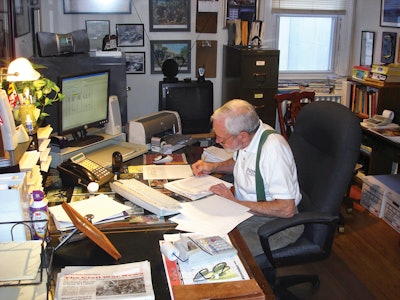 He worked until age 92.
He worked until age 92.
He prepared for boom or bust
Dad had been through boom and bust many times. He said, “It’s easy to be captain of a ship during calm waters; it’s when you’re in the typhoon you’re going to see a true leader.”
He always seemed to have the ability to predict a recession, and he would work smart during good times as if it were bad times. If times did get tight, he cut his fixed overhead immediately. If he had to drop insurance or go to skeleton crews, he would do it, because he felt that if the company survived, everyone would survive in the long run. He believed in cutting from the top down—he felt the last person who should be cut in pay was the man in the field, because that was who made it happen (at one point Dad cut his pay to $18,000 a year). Dad was good at adapting. When we had a fuel crisis in the ’70s and couldn’t get gas, he got the whole sales staff mopeds!
When times are on the upswing like they have been lately, you see business owners spending lots of money, buying boats and living high off the hog; they’re not putting any of that money away. I’ve seen it so bad that at one time we couldn’t even buy business cards. My father said, “Write your name on a piece of paper”—that’s how tight it got.
He created systems
Dad was big on creating systems, and he said they were like an accordion; when the economy is good you can stretch it out, and when the economy is tight you can close it, but if you have a good system you can apply it to one crew or 100 crews.
One system he created was an easy way of identifying and costing jobs. Still, to this day, when we have a job number, the first letter is the first letter of the salesperson’s name, followed by the first letter of the state the job is in (we do jobs in three states), the ID number of the job, and then at the end is either H or S for hardwood or sanding. When we buy material for that job, that material is costed with that job number. If we have additional costs or supplies, that bill has that job code on it, so each bill has a purpose—it’s not just willy-nilly.
He was always innovating
My father wasn’t afraid to spend money when he thought it would improve the business. At one point we had about 175 people, and in the very early days of computers, he bought one to do payroll. It looked like a big organ—that’s how huge it was. Of course, we didn’t have cell phones, so my dad had two-way radios installed; they were like CBs but it was just our channel. We had a main one at the office and then radios for the salespeople and foremen in the field. Dad was also the first guy in our area to have a moisture meter. I’ve still got it, it’s like half the size of a shoebox!
He focused on doing a good job
Dad was focused on quality. He said, “You give them a good job, and it will be the silent salesperson for you,” and that’s true. If you do good work, you’re going to be able to pay the bills. My mom recently commented to me that I’m a perfectionist. Those who know me know I’m not a perfectionist about many things—my truck, my clothes—but when it comes to floors, if I don’t ask for 110 percent, my manager will ask for 80 percent. And if he asks for 80, the guy on the job will ask for 65. You’ve got to expect the best, and you have to pay for it. If you lower your standards you’re going to get in trouble. If you buy cheap glue, if you skip-nail, if you buy cheap wood, in the long run, it’s not going to work.
Something my dad always said was, “Don’t worry about the mule going blind, just sit in the saddle and hold the lines.” That means: Don’t be worried about all the things you can’t change or do, just keep with the task you’re with and get on with it. Although Dad is gone now, we are going forward in the saddle, heading into our 70th year in the family business. I honestly don’t stop and think “What would Dad do?” because his philosophies are just the way we live our lives.
RELATED: A Historic Wood Floor ‘Like an Old Saddle’
















